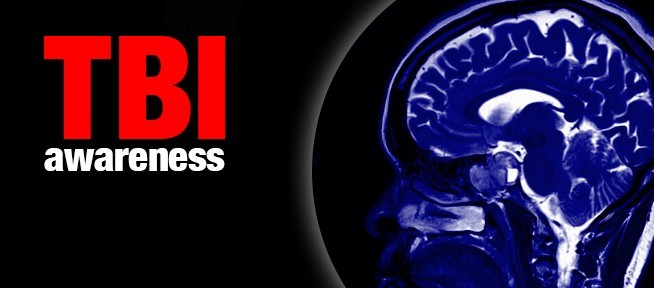Going without a helmet, having a track hatch fall on your head, or taking a fall during training are common ways a Servicemember sustains a Traumatic Brain Injury (TBI), however, most of these events are never reported. “Shake it off” we tell ourselves. “Take a knee and drink some water. Get back in the game. Keep moving.”
The day-to-day living of a Servicemember or Veteran is far more likely to result in a TBI than from an incident during combat. 80 percent of TBIs in the military are diagnosed in a non-deployment setting (e.g., car crashes, training falls, sports) and the lifestyle and activities of Servicemembers and Veterans (driving motorcycles, riding bicycles, climbing mountains) increase the risk of sustaining a TBI.
No one likes for a minor bump or bruise to slow them down, so “playing hurt” is frequently a part of life for those who have taken the oath to serve our country. However, left undiagnosed and untreated a TBI can have profound effect on the life of Servicemembers, Veteran and their caregivers. This is why Servicemembers and Veterans are screened for TBIs and help is made available for those who have suffered a TBI.
Asking for personal help, especially for a Servicemember or Veteran, can be difficult. Most would rather help than be helped. Asking for help that benefits your family, your team, or to accomplish the mission comes much easier. Getting the help needed for TBI often means putting aside egos and attitudes; and realizing that in order to help others you must first help yourself.

Dan Marshall is a retired Master Chief who served with multiple East Coast SEAL Teams. He has held all levels of tactical and operational leadership positions.
“The drive for me to get help was the fact that how could I tell my guys to go get help if I couldn’t help myself?” said Command Master Chief Dan Marshall. “If I can recommend anything, it would be to start early and start often in seeking help.”
The vast majority of individuals who sustain a mild TBI will completely recover. For those with persistent symptoms, VA has developed a system of care that supports Veterans with an individualized rehabilitation plan of care delivered by an interdisciplinary team of professionals in collaboration with the Veteran and their family.
Recognizing that you need help is an important first step.
The Department of Veterans Affairs Polytrauma System of Care (PSC) is there to provide that help. With five polytrauma rehabilitation centers, 23 polytrauma network sites, and 87 polytrauma support clinic teams across the country, the PSC, in a coordinated effort with the Department of Defense, serves Servicemembers and Veterans in all aspects of TBI care – from trauma to acute rehabilitation to community reintegration and in lifelong care and support.
It was thinking about the larger mission that motivated Command Master Chief Dan Marshall to take action and get the care he needed. As he put it, he “wanted to, one, continue to provide for my family and, two, remember my family.”
Ask your primary care provider about the VA Polytrauma System of Care or learn about us online at www.polytrauma.va.gov.
Topics in this story
More Stories
Veteran Byron Potier weighed almost 300 pounds and was tired and lethargic. He was the perfect candidate for gastric sleeve surgery.
How much do you know about VA care, benefits and services? Don’t miss out on what you've earned—check out the "2025 VA Federal Benefits Guide for Veterans, Dependents, Survivors, and Caregivers" handbook to learn more.
Feeling stressed? Your breath can help you relax and focus. Take 3 minutes to reset and prioritize your well being for this week's #LiveWholeHealth practice.








My brother Kevin had TBI, & until I took him to the VA & had him diagnosed it was a harrowing experience for me. He disappeard for 2 weekends taking the train to downtown Chicago & came home on a Sunday like he just went for cigarettes which totally freaked me out. I knew he needed to be on meds & under a Dr’s care. Once he was in the V A system things turned around dramatically. He lived with me until his death. We were very close & I miss him terribly. We were soul mates. He is definately in a better place with siblings & our parents. Ya Hoo & Praise The Lord …
I was injured while serving as a heat
Mechanic I injured my lower back all that was said to me was that I was making up the pain After serving Eighteen and a half years and fighting for compensation I have finally received 50 percent I now have two rods and four screws in my back and can’t work I’m still waiting for more correct compensation. Never Give Up
This is such a great article! I study the effects of TBI, and they can be wide-ranging, due to diffuse damage throughout the brain. Some of the “symptoms” may not even appear until 6-12 months after the injury. I study auditory dysfunction, which is a progressive central auditory processing disorder. It’s important for vets at risk of TBI to maintain contact with a physician, who can vouch for symptoms which appear weeks or months after the injury. I’d also like to add, as a fellow DV, that asking for help is a sign of strength, and it helps you get back some of the control over your body/brain.
I too was in a accident inside a Bradley FV in north Ft Hood, Tx,. I was wearing my CVC helmet still I incurred a concusion and also cracked the helmet on hit inside the Bradley!! Still having problems but able to cope and have the VA helping out as much as they can!!